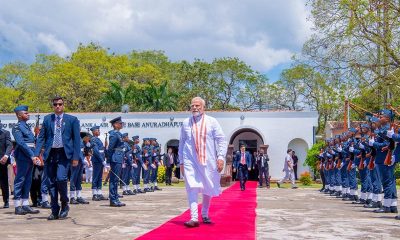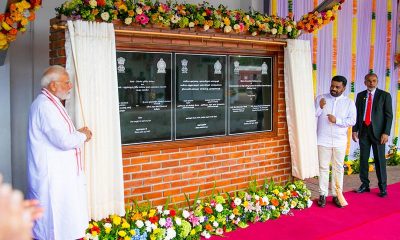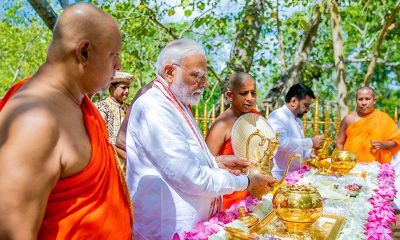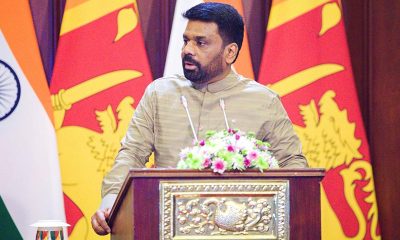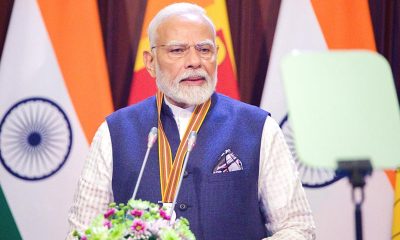News
New York based NGO points finger at Lanka again
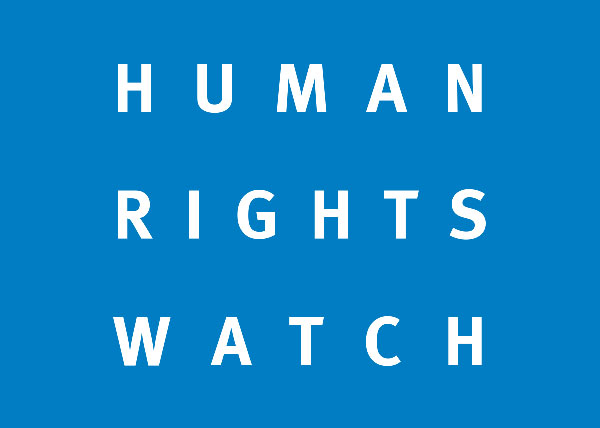
The New York based Human Rights Watch has accused Sri Lanka of using emergency regulations to harass and arbitrarily detain activists seeking political reform and accountability over the country’s economic crisis.
In a statement, HRW said since Ranil Wickremesinghe was sworn in as President on July 21, 2022, the police and military have sought to curtail protests through the intimidation, surveillance, and arbitrary arrests of demonstrators, civil society activists, lawyers, and journalists.
Anti-government protests in Colombo and elsewhere in the country led the then-President Gotabaya Rajapaksa to flee the country before resigning on July 15. On July 22, President Wickremesinghe ordered security forces to disperse protesters and break up their main site in central Colombo. The police have subsequently targeted perceived protest leaders for arrest and detention.
“The Sri Lankan government’s crackdown on peaceful dissent appears to be a misguided and unlawful attempt to divert attention from the need to address the country’s urgent economic crisis,” said Meenakshi Ganguly, South Asia director at Human Rights Watch. “Sri Lanka’s international partners should be clear that they need to be working with a rights-respecting administration to address Sri Lanka’s deeply rooted economic problems.”
Security forces injured more than 50 people in the July 22 early morning raid on the main janatha Aragalaya (people’s struggle) site in Colombo. Security forces assaulted and beat three journalists from Xposure News – Chaturanga Pradeep Kumara, Rasika Gunawardana, and Shabeer Mohammed – and at least one other journalist, Jareen Samuel of the BBC, during the raid. Wickremesinghe berated foreign diplomats for criticising the security forces’ use of excessive force and took no action to hold those responsible to account.
A number of Buddhist monks and Christian clergy had joined the protests. The media reported that the Colombo Magistrates’ Court on July 25 had issued a travel ban on Father Jeewantha Peiris, a Catholic priest who had been prominent in the protests, and several others. Two days later police visited Father Peiris’s church and said that they had orders to arrest him. In a July 31 statement, 1,640 members of the Catholic clergy condemned targeting the priest, saying that they had all backed the protests.
On July 26, the authorities arrested another prominent protester, Dhaniz Ali, from an international flight about to depart from Colombo. On July 27, unidentified men in civilian clothes abducted Veranga Pushpika, a former student activist and journalist who had also been active in the protests, from a bus in Colombo. Police did not disclose his whereabouts to lawyers or the Human Rights Commission for several hours before acknowledging his arrest.
Human rights defenders said that the police sought to obstruct defense lawyers from meeting with four protesters who had been arrested after they handed over to the police a large sum of money taken from the president’s official residence after protesters had occupied it.
Lawyers and media organisations told Human Rights Watch that they have experienced increased intimidation, including threats of violence and surveillance. In one episode, a group of men claiming to be police officers, but not wearing uniforms, visited the office of an online publication, Xposure News, on July 27 and demanded that a security guard identify people shown in photographs and show them CCTV footage.
On July 31, a student protester said in a statement on Facebook that he had been detained and interrogated for three hours by security force personnel who warned him that they could plant drugs on him and arrest him. Police summoned the social media activist Rathidu Senarathna, known as “Ratta,” on August 1 and arrested him after questioning. A Colombo magistrate also issued a foreign travel ban on Senarathna and 11 others suspected of illegal assembly and causing damage to property. On August 2, the authorities seized the passport of a British national, Kayleigh Fraser, who had posted about the protests on social media.
The authorities arrested at least seven people for the July 9 arson attack on Wickremesinghe’s private residence. Activists said that at least some of those detained were known to have been bystanders. Police are investigating a hotel that allegedly provided food to protesters and has raided, sometimes without warrants, the homes or workplaces of several protesters who are in hiding.
In a statement, 175 Sri Lankan human rights defenders and civil society organisations expressed concern about “disturbing developments of abduction, arrest, intimidation, and reprisals against protesters.” Members of the Catholic clergy said the government should “stop the repression of those involved and supporting the Aragalaya and focus on listening to grievances and aspirations of people and take actions to address both immediate and long-term problems.”
Under the state of emergency that President Wickremesinghe declared on July 18, the period that a person may be detained before being brought before a magistrate has been increased from 24 to 72 hours. The authorities have been granted sweeping additional powers of search and arrest, and the military has been empowered to detain people for up to a day without disclosing their detention. These provisions increase the risk of torture and enforced disappearance.
Under international human rights law, protections against torture, the excessive use of force, and other fundamental rights must never be violated, including during a state of emergency. Provisions of the state of emergency contrary to international standards should be immediately revoked, Human Rights Watch said.
The emergency regulations also introduce extreme new sentencing rules for several offenses, including damage to property and trespassing, which can now result in a life sentence and carry a minimum term of 20 years in prison. Among the offenses subject to harsher sentencing is a provision of the penal code that has previously been used to prosecute same-sex conduct. The decree provides that bail will not be available for those accused of offenses under the emergency regulations.
The state of emergency also gives the president and the police broad powers to ban public gatherings, allows the police or military to order anyone to leave any public place or face arrest, and makes it an offense to cause “disaffection” or to spread “rumors.” These provisions are vague, overly broad, and disproportionate in violation of the rights to freedom of expression, peaceful assembly, association, and movement.
In a statement following the assault on protesters on July 22, the European Union noted that it “expects the new Government to work in full compliance” with its human rights commitments, made in exchange for tariff-free access to the EU market under the bloc’s GSP+ program. The World Bank said in a statement that the government should address “the root structural causes that created this crisis to ensure that Sri Lanka’s future recovery and development is resilient and inclusive.” Earlier, the United States Senate Foreign Relations Committee stated that any agreement with the International Monetary Fund “must be contingent on … strong anti-corruption measures and promotion of the rule of law.”
“The people of Sri Lanka are reeling under an economic crisis that has plunged millions into food insecurity, the closure of schools, and shortages of medicine, fuel, and other necessities,” Ganguly said. “The government needs to end its repressive policies and practices and act urgently to address people’s basic needs, win public trust, and uphold the rule of law by holding those responsible to account.”
Latest News
Indian Prime Minister Shri Narendra Modi concludes State Visit to Sri Lanka
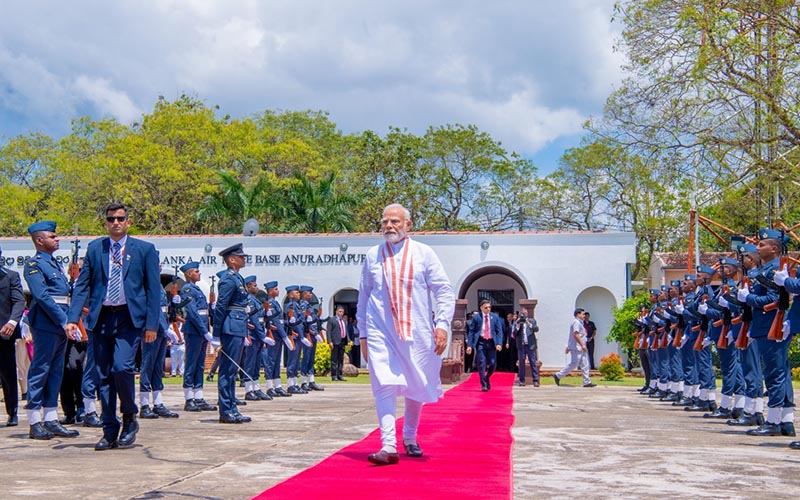
Indian Prime Minister Shri Narendra Modi departed today (06) from Air Force Base Anuradhapura concluding his State visit to Sri Lanka. The Indian Premier embarked on a tour to Sri Lanka at the invitation from President Anura Kumara Disanayake.
This visit underscores the enduring relationship encapsulated by the theme “Friendship of Centuries, Commitment to a Prosperous Future,” further solidifying the bonds between India and Sri Lanka.
This marks Prime Minister Modi’s fourth visit to Sri Lanka, which has further enhanced the economic, cultural, and historical relations between the two nations, while also reinforcing their multifaceted partnership. This visit by the Indian Prime Minister reinforces Sri Lanka’s important role in India’s “Neighbourhood First Policy” and ‘MAHASAGAR’ vision concerning diplomatic relations.
This state visit is anticipated to yield significant results on various collaborative initiatives, fostering a path towards mutual growth and development. The citizens of Sri Lanka will soon be able to witness the fruitful outcomes of these partnerships, and Indian Prime Minister Shri Narendra Modi’s visit will mark a significant milestone in the government’s pursuit of sustainable development focused on the needs of the people.
Accompanying Indian Prime Minister Modi were Indian External Affairs Minister Dr. S. Jaishankar, National Security Advisor Ajit Doval, Foreign Secretary Vikram Misri and a delegation of senior officials from the Indian government.
[PMD]
Latest News
President Dissanayake and Indian PM Modi jointly commission upgraded Maho-Omanthai railway line & Maho-Anuradhapura railway signalling system
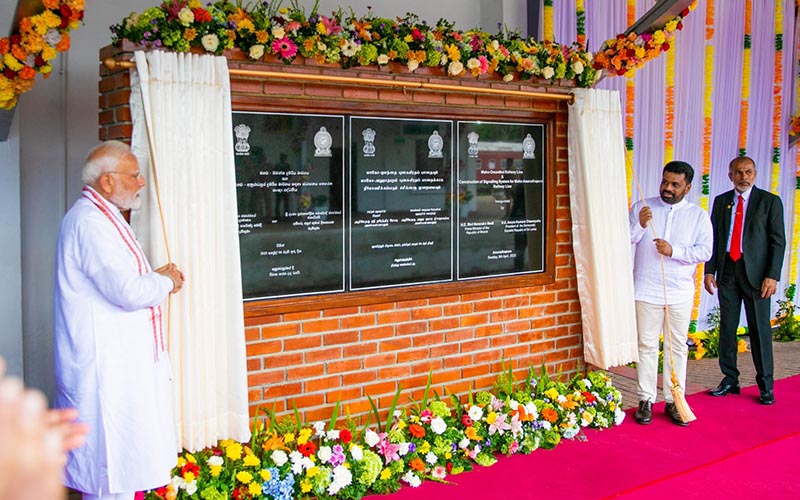
The upgraded Maho–Omanthai railway line and the newly installed Maho–Anuradhapura railway signalling system were officially commissioned by Indian Prime Minister Shri Narendra Modi and President Anura Kumara Disanayake today (06)
The Prime Minister of India is currently visiting Sri Lanka at the invitation of President Anura Kumara Disanayake, reinforcing the longstanding bond encapsulated in the theme “Friendship of Centuries Commitment to a Prosperous Future” between the two nations.
Highlighting one of the key aspects of this visit, the two leaders participated in these inaugural ceremonies. The President and the Prime Minister of India jointly unveiled the commemorative plaque and commissioned the railway line and signalling system.
The upgraded Maho-Omanthai Railway Line project was carried out with funding through the Indian Credit Line, totalling an investment of US$ 91.27 million. The Maho–Anuradhapura railway signalling system, established as a result of President Disanayake’s recent visit to India, was funded by the Indian Government at a cost of USD 14.89 million.
[PMD]
Latest News
Prime Minister Modi and President Dissanayake pay homage to the sacred Jaya Sri Maha Bodhi
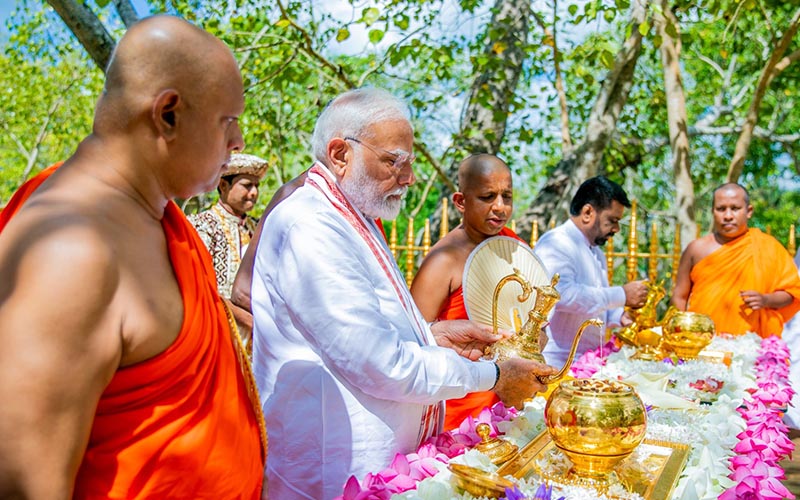
Indian Prime Minister Shri Narendra Modi, currently on a State visit to Sri Lanka, along with President Anura Kumara Disanayake paid homage to the sacred Jaya Sri Maha Bodhi in Anuradhapura this morning (06) and received blessings.
Following his visit to the sacred site, Prime Minister Modi proceeded to the Udamaluwa, where he met with the Chief Incumbent of the Atamasthanadhipathi and Chief Sanghanayake of Nuwarakalaviya, Most Venerable Dr. Pallegama Hemarathana Nayaka Thera, for a cordial discussion.
During the meeting, the Prime Minister shared that relics of the Buddha were discovered in excavations conducted in his home state of Gujarat during the 1960s. He further stated that he would discuss with the President of Sri Lanka the possibility of exhibiting these sacred relics in Sri Lanka.
Responding to a request made by the Atamasthanadhipathi to develop Bodh Gaya as a spiritual city, Prime Minister Modi assured that he would take the necessary steps after discussions with President Disanayake and work towards making it a reality.
The Maha Sangha, led by the Atamasthanadhipathi, chanted Seth Pirith and invoked blessings on the Indian Prime Minister.
The Indian Prime Minister also left a commemorative note in the special guest book at the site. In addition, he formally declared open the newly constructed ‘Makara Thorana’ within the Jaya Sri Maha Bodhi premises.
The occasion was also attended by Chief Incumbent of the Ruwanweli Maha Seya Temple Ven. Ethalawetunawewe Gnanathilaka Thera and other Atamasthana Viharadhipathi Theras, Minister of Foreign Affairs, Foreign Employment and Tourism Vijitha Herath, Minister of Trade, Commerce, Food Security and Cooperative Development, Wasantha Samarasinghe, Minister of Health and Mass Media Dr. Nalinda Jayatissa, North Central Province Governor Wasantha Jinadasa, Indian High Commissioner Santosh Jha and others.
[PMD]
-

 Business2 days ago
Business2 days agoDaraz Sri Lanka ushers in the New Year with 4.4 Avurudu Wasi Pro Max – Sri Lanka’s biggest online Avurudu sale
-

 News7 days ago
News7 days agoBid to include genocide allegation against Sri Lanka in Canada’s school curriculum thwarted
-

 Business3 days ago
Business3 days agoStrengthening SDG integration into provincial planning and development process
-

 Business2 days ago
Business2 days agoNew SL Sovereign Bonds win foreign investor confidence
-

 Sports4 days ago
Sports4 days agoTo play or not to play is Richmond’s decision
-

 Features16 hours ago
Features16 hours agoStarlink in the Global South
-

 Latest News6 days ago
Latest News6 days agoIPL 2025: Rookies Ashwani and Rickelton lead Mumbai Indians to first win
-
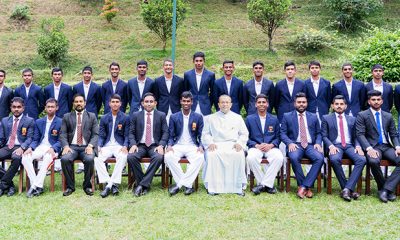
 Sports5 days ago
Sports5 days agoTrinity, St. Anthony’s out to end decade long victory drought


